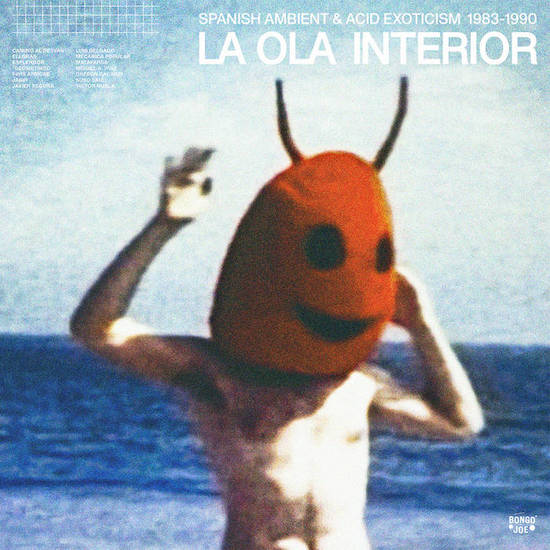Talking about anything vaguely countercultural in Spain, from the mid-1970s to at least the most recent date covered on this new compilation by globally-minded Swiss label Bongo Joe, seems like something of a bluffer’s charter. Everything – outrage, insularity, multiculturalism, good cheer – can be interpreted as a product of the post-Franco era, if you feel so inclined. I’m not going to insult your intelligence by being one of those bluffers, but I come before you to praise La Ola Interior, so maybe we’ll halfway figure what made these artists tick.
The 12 acts collected here are very much the product of affordable synths and compact recording techniques. A light is shone on a scene which drifted between Berlin School type ambience, clanky industrial and loop-based proto-techno music, largely distributed via a DIY cassette network (the Spaniards seem to have stuck with tapes quite a bit into the 90s, when the original cassette culture had otherwise vanished) and mainly contained within the country’s borders. Esplendor Geométrico, inspired by the likes of Throbbing Gristle, were more internationalist in their reach than most of their peers (their first tape, in 1982, was released on a German label). While they still exist today, this comp’s ‘Sheikh’ dates from 1988 and is equally tribalistic and hauntological, to the extent one can ever pin down such terms. They’re the only name here to also feature on La Ola Interior’s sort-of prequel La Contra Ola, released in 2018 and compiling Spanish synthpop, postpunk and new wave from 1980-86; EG’s relatively accessible side is represented in both cases.
As is briefly acknowledged in the sleevenotes, LOI timespan coincides with the development of the ‘Balearic sound’ on Ibiza, but the closest these selections come to that is ‘Trivandrum’, one of three tracks by Miguel A. Ruiz and with a central melody you might either find trillingly tropical or evocative of seagulls during a morning hangover. Finis Africae, a trio whose musical roots curled back to the 1960s, actually penned a Café Del Mar staple and chillout prototype in ‘El Secreto De Las’, but you’d hardly credit that from the two oily weirdouts here. ‘Hybla’s ambling tempo and confluence of bells, shakers and woodwind seems like a cousin of Current 93 type absurdism, or what the Incredible String Band might have veered into if they’d never lost their hardcore; ‘Hombres Lluvia’ proffers crawl-slow Arabic instrumentation, vocals buried and slurred, and some sort of watery field recording going to and from prominence.
Like Finis Africae’s Juan Arteche, Jabir aka Francisco González was middle-aged by the time his two late-80s albums were released, having immersed himself first in jazz then in Arabic spirituality. ‘Vuelo Por Las Alturas De Xauen’ contains misty, almost Celtic sounding flutes and intuitive patch experiments in the vein of the 1960s American set. Conversely, Eli Gras was only born in 1971 but, remarkably, was making strange experimental music collectively and solo in the early 80s: ‘Flu’, recorded in her mid-teens but unearthed recently, is minimal synth whose steps are deliberate almost to the point of paranoia.
The ambient promised in LOI’s subtitle is amply provided, and provides some highlights. Three tracks by Camino Al Desván, a Barcelona duo – Gras also hails from the Catalonian city; everyone else mentioned from Madrid – span glassy new age-adjacent keyboards, rustic psychedelia on hurdy-gurdy or something similar, and obtuse, grumbling industrial. Suso Saiz’s ‘Horizonte Paseo’, unreleased until now, is bright tonality not unlike Charlamagne Palestine, and my pick of the compilation is ‘El Llanto De Nouronihar’, by Luis Delgado, another Finis Africae member: incredible nocturnal drone that would sound entirely modern at any point until now. Needless to say, La Ola Interior merely skims the surface of Spain’s 80s synth underground, likewise the (still informative) sleevenotes: I’d read a book on this, or at least a longer-than-longform article, not least for the possibility of its cultural context being sketched out by a non-bluffer.



